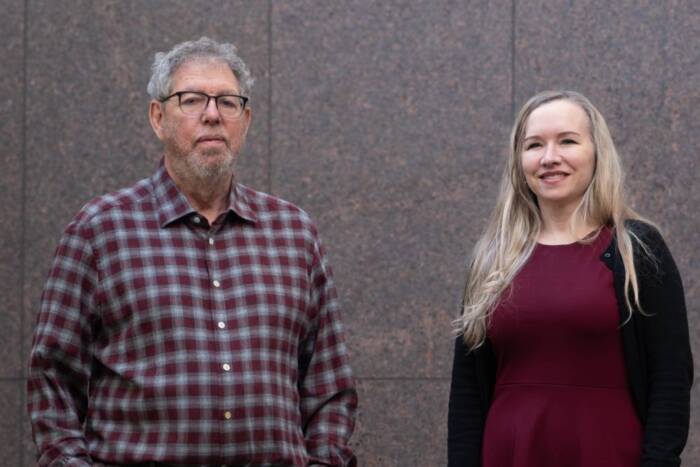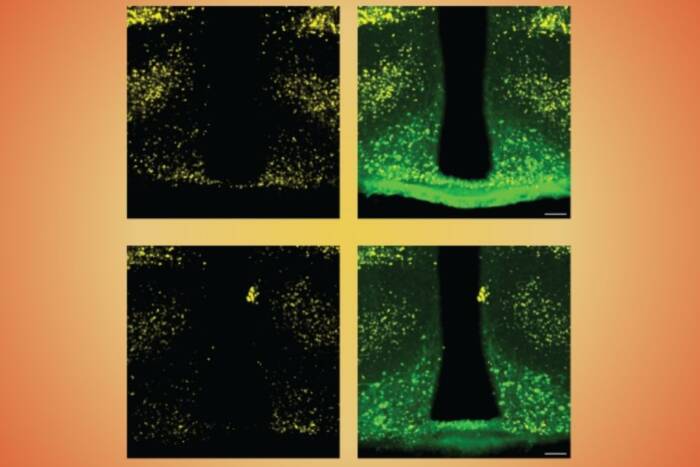Drug discovery institute seeks proposals for innovative antibody projects
by Julie Grisham, freelance writer

A chemist at work in the Tri-I TDI laboratories in Weill Cornell Medical College’s Belfer Research Building.
The Tri-Institutional Therapeutics Discovery Institute (Tri-I TDI) has reached a new milestone in its effort to advance the development of new drugs based on basic science discoveries made at Rockefeller and its two neighboring institutions, Weill Cornell Medical College and Memorial Sloan Kettering Cancer Center. The initiative is expanding its scope to support the development of antibody therapies, which are successfully used for the treatment of diverse classes of diseases, including multiple types of cancer, infectious and autoimmune disorders, and cardiovascular diseases.
The Tri-I TDI is currently accepting applications for new antibody projects aimed at bringing innovative ideas to the so-called proof-of-concept stage, an early step in the development of a new medical product.
When the Tri-I TDI was launched in 2013, by the three institutions with Takeda Pharmaceutical Company Ltd. as an industry partner, its initial focus was to support the development of drugs made up of small, synthetic molecules. Many of these drugs are targeted therapies—treatments designed to influence the behavior of cells to ultimately eliminate or weaken the activity thought to underlie disease.
“Antibody therapies will be the second pillar of the Tri-I TDI,” says Ivo Lorenz, the institute’s vice president for biologics. “They represent a different way to design a targeted treatment, and are gaining more and more importance.”
Moving beyond small molecules
In fact, five of the 10 top-selling drugs in 2014 were antibodies. Antibody therapies offer some advantages over small molecule drugs, Dr. Lorenz explains. For one thing, because they bind more specifically to their targets, they tend to have fewer side effects. Many also last longer in the body, which means they can be given less often, making them more convenient for patients. And, because they naturally interface with the immune system, they can amplify their own activity in the body.
There are downsides as well. Antibodies are large, complex proteins, requiring specialized manufacturing approaches. And while many small molecules can be administered to patients orally, antibody therapies must be injected. Also, antibodies are most appropriate for targeting molecules that are secreted by cells or displayed on the cell surface.
“Antibodies have evolved over the past 400 million years to play a central role in host defense,” says Jeffrey Ravetch, Theresa and Eugene M. Lang Professor and head of the Leonard Wagner Laboratory of Molecular Genetics and Immunology. “They provide specificity, diversity, and memory, and they shape adaptive immunity and couple it to the effector pathways of the innate immune response.”
As scientists move beyond the first generation of antibody therapies, they are beginning to design “engineered antibodies” capable of playing multifaceted roles in immunity. “Harnessing these finely tuned molecules as therapeutics presents unique opportunities and challenges,” Dr. Ravetch says. “TDI, by bringing together academic and industry scientists committed to understanding how antibodies work and how to exploit them as therapeutics, is positioned to be at the forefront of this next phase of exploiting antibodies as drugs.”
He serves on the scientific advisory board of the Tri-I TDI along with Michel Nussenzweig, Zanvil A. Cohn and Ralph M. Steinman Professor and head of the Laboratory of Molecular Immunology. The board also includes experts from Memorial Sloan Kettering and Weill Cornell, representatives from the industry partner, and external advisors.
Providing a boost for promising research
The proposals the group is currently accepting are for early-stage, exploratory projects based on innovative ideas. To apply for support, scientists need only to describe a scientific rationale for why they think a certain protein or cellular pathway might offer an effective drug target. Dr. Lorenz’s lab will then take that idea and generate antibodies to be used as a validation tool in lab experiments. Projects will “graduate” from this early-stage program when they’re ready to move into preclinical evaluation using animal models.
“We’re very flexible about what these projects will focus on,” Dr. Lorenz says. “They could be in oncology, cardiovascular disease, infectious disease, or other areas. They could focus on big problems that affect a lot of people, or rare, ‘orphan’ diseases. As long as the project involves an antibody and has therapeutic potential, it’s appropriate to submit a proposal.”
Letters of intent for early-stage, exploratory antibody projects are being accepted through April 20 and will be closely followed by a request for advanced-stage, therapeutic antibody project proposals. Visit the Tri-I TDI website for more information on how to apply.


